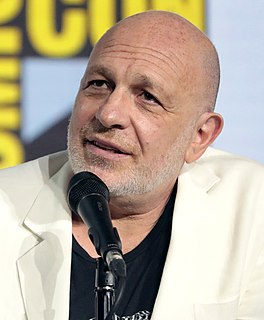A Quote by Killian Scott
I think when you're a fan of a book you do have your own little version of the characters and I hope that some people feel we are the versions they might have imagined.
Related Quotes
I think we all carry within us different versions of ourselves. Our true, greatest, most honest versions of ourselves can either be developed and nourished, or it can remain dead from neglect. Most people opt for the easiest version rather than the best.
But in the end which version lives, which version thrives and which version dies, depends on the choices we make and the people in our lives.
It's funny what [producer Richard Zanuck said about even though you can't quite place when the book or the story came into your life, and I do vaguely remember roughly five years old reading versions of Alice in Wonderland, but the thing is the characters. You always know the characters. Everyone knows the characters and they're very well-defined characters, which I always thought was fascinating. Most people who haven't read the book definitely know the characters and reference them.
It's easy to feel like you don't have any control over yourself or your life or your body as a teen - everything is changing so fast, and a lot of it feels so outside of your power. I think that's why a lot of teens form really strong attachments to fictional characters or celebrities, draw their own characters or write themselves into fan fiction.
I hope that if the people who read my work encounter people in the real world who are like the characters that I write about, that maybe that might make them feel empathy for those people. I know it sounds idealistic in a way, but I do hope that my work maybe changes some minds, and that my work makes readers see people as human that maybe before they read my work they might not have seen as humans, and those people include me and my family and my kids, people in my community.
I think that if you are sticking to the text, essentially, you're not trying to write your own version of it. I mean, of course, it is your own version of it. And every translator would probably have a different version. But I think that that's what keeps the writers from being individual in English. They may be my English, but I don't think that Ferrante sounds like Levi.
Make sure your characters are worth spending ten hours with. That’s how long it takes to read a book. Reading a book is like being trapped in a room for ten hours with those characters. Think of your main characters as dinner guests. Would your friends want to spend ten hours with the characters you’ve created? Your characters can be loveable, or they can be evil, but they’d better be compelling. If not, your reader will be bored and leave.
...It's all sort of dreams and it's all illusion. It's theater; it's not real. We're making up stories, you know, and people tend to run into you and believe you are your characters. And I suppose the funny thing is the longer you go, you do become sort of some version of [your characters]. You both diverge from them - you know - you live, but you also permanently inhabit that geography and that mental space - and so you do morph a little bit. We do become what we imagine.
Adaptation is always the same process for me, which is some version of throwing the book at the wall and seeing what pages fall out. It is trying to imagine, remember the story, read it, put it down, and then write sort of an outline without the book in front of you with some hope that what you like about it will be filtered and distilled out through your memory and then that will be similar to what other people like about it.



































